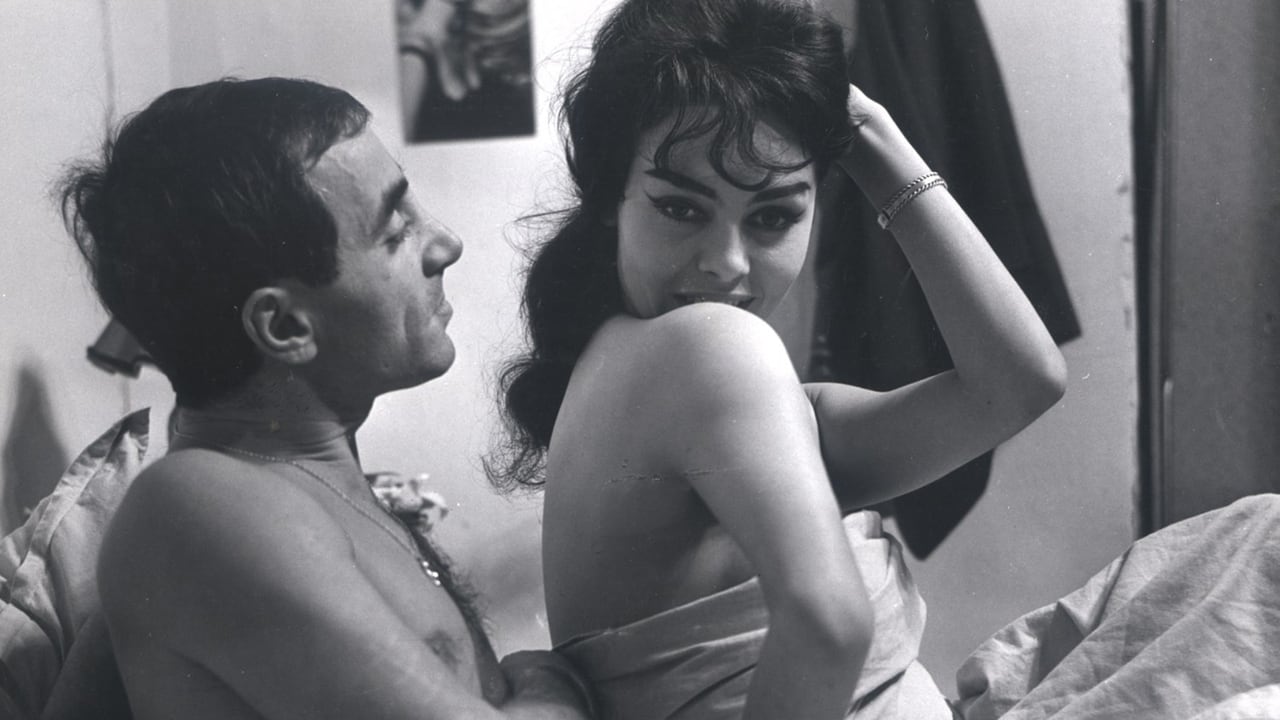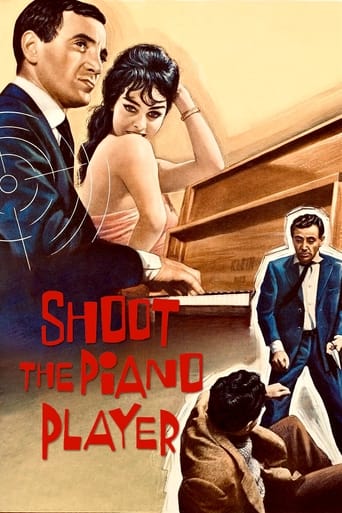

Very interesting film. Was caught on the premise when seeing the trailer but unsure as to what the outcome would be for the showing. As it turns out, it was a very good film.
... View MoreThis is one of the few movies I've ever seen where the whole audience broke into spontaneous, loud applause a third of the way in.
... View MoreThe plot isn't so bad, but the pace of storytelling is too slow which makes people bored. Certain moments are so obvious and unnecessary for the main plot. I would've fast-forwarded those moments if it was an online streaming. The ending looks like implying a sequel, not sure if this movie will get one
... View MoreBlistering performances.
... View MoreAfter the elaborate success of his debut Truffaut went into this film seeking to subvert and play with the noir archetypes, the Hollywood B-movies with the jaded, rough edged leading men, the despicable criminals, the sultry femme fatales. So the film shifts from the jaunty opening piano tune to a dizzying night-time chase; smash cuts push the headlights up into the running man, which then suddenly switches to a mundane conversation about the challenges of married life. There are no clear cut rules or boundaries here as the French New Wave dictates, so clichés get turned on their head. Charlie and Lena get picked up in broad daylight and driven to god- knows-where, but the conversation inexplicably turns into a humorous matter-of-fact spiel about the perils and madness of the women in their lives. See how Truffaut shoots this scene; the camera free-flowing and hand-held, capturing their giggles and jokes as if this was not a threatening kidnapping but rather young students on a summer road-trip. In Aznavour we have a timid, almost cowering leading man. He plays his cheerful piano at the local dive whilst the patrons dance away during the night of their lives and his face is curled up in the background, forlorn and miserable. This composition is not withdrawn and broody as it should be; in fact the humour comes from the irony and almost bizarre, slapstick contrast it creates. We see it again in the closing shots. Opposing this feeble lead are strong female characters; not ones that abuse and flaunt their sexuality, but thoughtful, vulnerable women who see past convention and are not so easily wooed. The most genuine and startlingly funny scene is Charlie attempting the simple act of trying to hold Lena's hand. This little action is ballooned up in his thoughts - he extrapolates everything and panics over the slightest reaction. His intrusive, gun-shy thoughts are not unlike our own - slowly weeding its way into our insecurities and making a big deal out of nothing. And then it is not anything he does, but rather the sheer physical embarrassment on his face that opens the floodgates and smiles. Another notable scene is his nervousness in pushing the bell to the door of the audition; Truffaut pushes into closeup more and more with each successive edit, then abruptly cuts to a wide shot of the hallway, showing just how tiny and insignificant he is. He shrinks instead of rising to the challenge. Would a noir ever apply this cut to its protagonist? What a cosmic farce Charlie lives in. He shows not the least amount of interest in the criminal affairs that he is nevertheless dragged in because of his family. The genre morphing from Truffaut has led him to become thoroughly confused about what sort of man he is and what sort of man he should be. Instead of comforting his despairing wife like his good nature tells (nags incessantly, more like) him to, he runs away coldly like a noir hero might, buffeted by his troubling thoughts. And he drags Lena back into the underground, and gets her killed in a meaningless affair. Nothing ever seems to fit nicely. The kidnappers again descend into comical nonsense as they debate many trivialities with the young Fido who should be terrified. Tinkling, light music invades the dark, grim night-scapes. Charlie is left once again to play his cheerful tunes. His face is etched in regret; how could he have gone wrong?
... View MoreFrom director François Truffaut (The 400 Blows, Jules et Jim), whether the title is Pianist or Piano Player, it doesn't matter, it wasn't a French film I would have heard of without the book 1001 Movies You Must See Before You Die, but one I looked forward to watching. Basically Charlie Kohler (Charles Aznavour) plays piano in a dive bar, following his wife's suicide he has become somewhat washed up, the waitress Léna (Marie Dubois) who works in the bar as well and is in love with him, but he may not be all he appears. One evening while playing he is approached by his brother Chico Saroyan (Albert Rémy), a crook who takes refuge as he is being chased by two gangsters, Momo (Claude Mansard) and Ernest (Daniel Boulanger), Charlie is becoming inadvertently dragged into the situation and rejoin his family he no longer wanted to be a part of. Charlie confesses his past to Léna, his real name is Edouard Saroyan, he used to be a famous pianist, but quit his successful career after his wife Thérèse Saroyan (Nicole Berger) killed herself, she was also a waitress. The situation gets more complicated when Charlie's other younger brother Fido Saroyan (Richard Kanayan), who lives with him, is kidnapped by the gangsters, forcing him to take drastic actions, but consequences will comes and it ends in tragedy. Also starring Charles Aznavour as Charlie Kohler, Michèle Mercier as Clarisse, Jean-Jacques Aslanian as Richard Saroyan and Serge Davri as Plyne. I will confess having to read subtitles can be annoying so I perhaps didn't see why critics give it five out of five stars, but apparently this is a forgotten gem, it does well to pay homage to classic film noirs, the melancholic romance is relatively interesting, and there are the right thrilling moments, it is a watchable crime drama. Very good!
... View MoreTruffaut introduced himself with 'The 400 Blows', a film of very good taste. His 2nd effort, 'Tirez sur le pianiste', isn't a let down, quite the contrary, it's a generally quite enjoyable film that tells the story of a piano player in trouble.This interesting french film is a clever combination of comedy, drama, crime, thriller and suspense. It approaches the policial genre, as well as the atmosphere sometimes approaches darkness, even the noir genre. Nevertheless, the levels of action are very modest. But I'm not the hungry for action type, so that fact doesn't bother me. Another thing is that there isn't one truly tense scene, even in the scenes which are supposed to be tense. Even the bad guys are not intrinsically evil enough to be much of a problem and therefore they're not really scary or intimidating.It wouldn't be far from the truth claiming that another achievement is how this displays humor in less than good circumstances. For example, there is a scene when Charlie and Léna are being kidnapped by the bad guys and Charlie says a funny line about women: «If you've seen one, you've seen them all» - and they all erupt into laughter. Even I laugh out loud with that line, even more so considering it is so true. The piano music by the talented musician Georges Delerue is relaxing to hear, it's like poetry for the soul. Cinematography is great and obeys to the principles of liberty so characteristic of Monsieur Truffaut.Frankly speaking, I think all of the actors are great in this. And I mean all. Charles Aznavour, a talented singer, is just as interesting as an actor, as his performance proves. Albert Rémy is, again, great. Richard Kanayan has a bigger role here as Fido Saroyan but still far from being a big role. Nevertheless, he is hilarious. That kid had charisma and talent. His big, floppy hair; his weird, raspy voice; his dance-walk style; his lips's movement; the fact that the actor was quirky and hyperactive... all of that made him unique and hilarious.The bad guys are funny and pretty cool for bad guys and they're well played by the actors: Claude Mansard as Momo and Daniel Boulanger as Ernest. As for the beautiful women (Marie Dubois as Léna and Michèle Mercier as Clarisse), I also like the way they play their roles.All in all, great movie. Only its ending is somewhat rushed and ambiguous, although satisfying aside the fact that the girl gets shot.Title in Portugal: 'Disparem sobre o pianista'.
... View MoreMay be i expected more from this flick....but it started like a comedy,slowly into a melo drama with more plots added to the film. the suspense factor wasn't there though it had his moments..but the main disappointment for me is sometimes the characters weren't aware wat happening around them.... the protagonist didn't care of his rico(if i am correct) his brother child was with the gangsters..at the time he doesn't care abt him,but instead he thinks of philosophy and all...its out of normal to me. but a brilliant camera works..some dialogues was funny...truffaut did with what thought i cant understand.. i read review saying great movie. but it falls short not being great or bad movie.... not tat much recommended i give 6 out of 10...
... View More